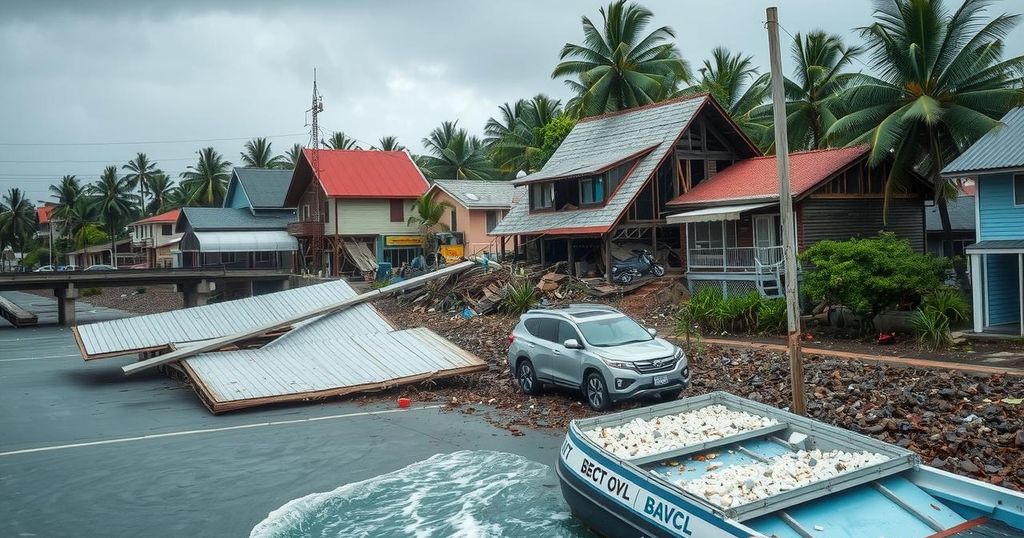World news
AFRICA, ASSOCIATED PRESS, BFMTV, BI, BIEUVILLE, BRUNO GARCIA, CHI, EMERGENCY RESPONSE, EUROPE, FRANCE, FRANCOIS -, HOTEL CARIBOU, INDIAN OCEAN, INTERIOR MINISTRY, MADAGASCAR, MAMOUDZOU, MAYO, MAYOTTE, MOZAMBIQUE, NATURAL DISASTER, NATURAL DISASTERS, POWER OUTAGES, REUTERS, WASHINGTON DC
Daniel O'Connor
0 Comments
Cyclone Chido Devastates Mayotte: A Catastrophe Compared to an Atomic Bomb
Mayotte has experienced extensive destruction following Cyclone Chido, a category 4 storm that inflicted catastrophic damage on the French territory. With winds exceeding 220 km/h (136 mph), officials anticipate the death toll may reach hundreds or thousands as entire neighborhoods were flattened. Rescue efforts are hindered by blocked roads and a severely damaged infrastructure, exacerbating the challenges faced by this economically disadvantaged region.
Devastation has struck Mayotte, a French archipelago in the Indian Ocean, as a powerful cyclone, termed the “100-year cyclone,” wreaked havoc over the weekend. The cyclone, known as Chido, brought winds exceeding 220 kilometers per hour (136 miles per hour), resulting in extensive damage reminiscent of an atomic explosion. Local officials estimate the death toll may surge into the hundreds or even thousands, amid reports of entire neighborhoods obliterated. Essential infrastructure, including hospitals, schools, and the airport, sustained serious damage, posing significant challenges for rescue and recovery efforts.
Eyewitness accounts from residents paint a dire picture. Bruno Garcia, owner of Hotel Caribou in the capital, Mamoudzou, stated, “We lost everything. The entire hotel is completely destroyed. There is nothing left. It’s as if an atomic bomb fell on Mayotte.” Meanwhile, Mohamed Ishmael described the environment as resembling a nuclear disaster zone, with entire neighborhoods having vanished. At least 11 fatalities have been confirmed, yet officials warn this number is likely to rise sharply due to the storm’s intensity and breadth of destruction.
The cyclone’s aftermath has exacerbated existing socio-economic issues in Mayotte, known as the poorest territory in the European Union, plagued by high rates of poverty and unemployment. Many areas remain cut off from aid due to blocked roads, further complicating relief efforts. France has dispatched rescuers and aid to assist the devastated territory, though access is severely hindered. The cyclone underscores the escalating risks associated with climate change, which scientists attribute as a driving force behind increasing storm severity and frequency, impacting vulnerable regions such as Mayotte.
Mayotte is a French overseas territory located in the Indian Ocean, known for its diverse culture but grappling with significant socio-economic challenges. With a population of approximately 300,000, it faces persistent issues such as poverty, unemployment, and inadequate infrastructure. Cyclone seasons in the southwest Indian Ocean typically extend from mid-November to the end of April, with climate change contributing to the increasing severity of these storms. The recent cyclone Chido is particularly notable as it is the most powerful storm to impact the region in over 90 years, demonstrating how climate-related events can devastate already vulnerable communities.
In conclusion, Cyclone Chido’s catastrophic impact on Mayotte serves as a sobering reminder of the vulnerabilities faced by communities in disaster-prone regions. As the situation unfolds, the extent of human suffering and infrastructural destruction becomes increasingly evident, highlighting urgent needs for humanitarian aid and long-term strategies to mitigate the impacts of future cyclonic activity exacerbated by climate change. The recovery process will necessitate a coordinated effort between local authorities and international aid organizations to address both immediate and long-term needs of the affected population.
Original Source: www.cnn.com




Post Comment